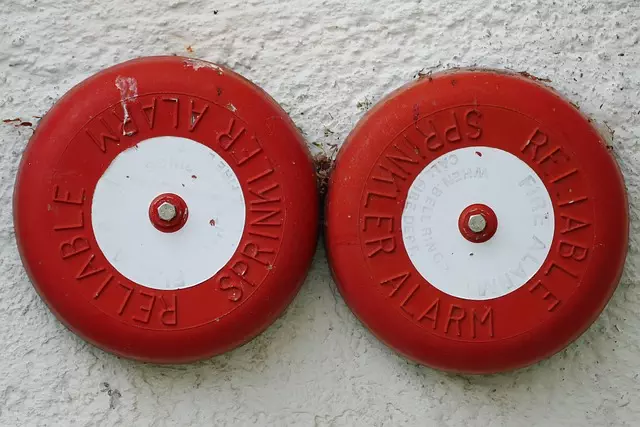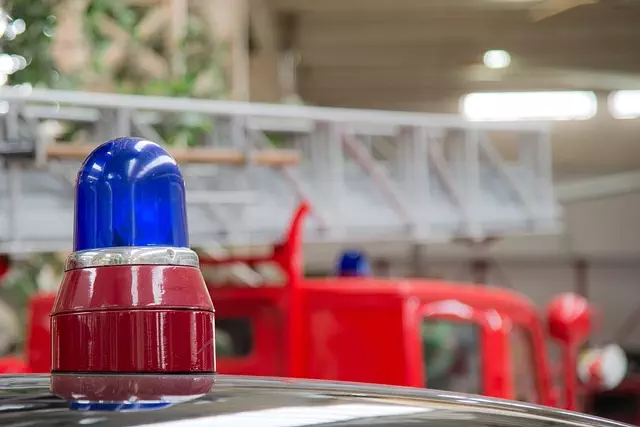Fire alarm systems in healthcare facilities are critical for rapid evacuation and life safety. In Jacksonville, North Carolina, it's imperative to select a specialized fire alarm system installation provider with expertise in medical environments. These providers must design comprehensive systems that cover all areas of the facility, ensuring reliable fire detection and swift alerting to staff and patients. The installed systems must comply with local regulations, integrate with other safety systems, and be designed to minimize false alarms, especially considering the presence of sensitive medical equipment. Advanced addressable fire alarm systems can enhance response efficiency by pinpointing exact fire locations. Additionally, healthcare facilities should ensure their systems are interconnected with other life safety systems for a coordinated emergency response. Regular maintenance, testing, and adopting features like remote monitoring capabilities are essential to maintain the reliability of these systems. Healthcare providers in Jacksonville, North Carolina, can benefit from local services that offer cutting-edge fire alarm system installation, aligning with both local and national safety standards such as NFPA 101. This approach not only ensures compliance but also demonstrates a commitment to patient, staff, and asset protection within healthcare settings.
In healthcare facilities, the safety of patients and staff is paramount, and a robust fire alarm system is a critical component of this commitment. This article delves into the necessity of these systems, highlighting their role in ensuring rapid response to emergencies. We explore best practices for fire alarm system installation in Jacksonville, North Carolina, emphasizing compliance with stringent standards. Furthermore, we examine advanced features and technologies that modern fire alarm systems bring to healthcare settings, enhancing protection and safety. Understanding these aspects is crucial for maintaining a secure environment within the healthcare sector.
- Understanding the Importance of Fire Alarm Systems in Healthcare Facilities
- Best Practices for Fire Alarm System Installation in Jacksonville, North Carolina
- Compliance and Standards for Fire Safety in Healthcare Environments
- Advanced Features and Technologies in Modern Fire Alarm Systems for Healthcare Settings
Understanding the Importance of Fire Alarm Systems in Healthcare Facilities

Healthcare facilities are some of the most sensitive environments where the safety and security of patients, staff, and visitors are paramount. In such settings, a well-designed and effectively maintained fire alarm system plays a critical role in ensuring the prompt evacuation of individuals and safeguarding lives and property. The importance of installing a reliable fire alarm system cannot be overstated, especially given the unique challenges posed by healthcare facilities, which often include flammable materials, high-risk patients who may not be mobile in an emergency, and critical infrastructure that cannot afford downtime due to fire damage.
For healthcare providers in Jacksonville, North Carolina, and beyond, the choice of a fire alarm system installation provider is crucial. Expertise in tailoring systems to the specific needs of medical environments is essential, ensuring that every corner of the facility is covered, from patient rooms to critical care areas and administrative offices. The right system not only detects fires but also alerts staff and patients quickly, initiating an emergency plan that minimizes risk and maximizes response time. Professional installation services like those offered in Jacksonville, North Carolina, ensure that fire alarm systems are not only compliant with local regulations but also capable of integrating with other safety systems, providing a comprehensive approach to protection.
Best Practices for Fire Alarm System Installation in Jacksonville, North Carolina

In Jacksonville, North Carolina, adhering to the best practices for fire alarm system installation is paramount for the safety of healthcare facilities and their occupants. The unique nature of these environments demands careful consideration during the planning and execution of any fire alarm system installation. Local regulations must be strictly followed, ensuring that systems are designed with sufficient sensitivity to detect fires promptly without the risk of false alarms. Integrating smoke detectors, heat sensors, and alarm notification appliances should be done by licensed professionals who understand the nuances of healthcare settings, such as the presence of critical medical equipment that cannot be compromised. Additionally, zoning strategies must be employed effectively to differentiate between various areas within the facility, allowing for targeted responses during an emergency. The use of advanced technology, like addressable systems, can enhance the efficiency of fire alarm systems by pinpointing the exact location of a fire incident.
Healthcare facilities in Jacksonville, North Carolina, must also ensure that their fire alarm systems are interconnected with other life safety systems, such as sprinklers and emergency lighting. This integrated approach to fire safety ensures a coordinated response that can save lives and minimize property damage. Regular maintenance and testing are equally critical components of best practices for fire alarm system installation. Routine checks by qualified personnel ensure the reliability and functionality of these systems. Moreover, healthcare facilities should consider the incorporation of modern features like remote monitoring capabilities, which enable real-time surveillance and immediate action from offsite locations. By following these best practices, Jacksonville’s healthcare facilities can provide a higher level of protection for their patients, staff, and assets against the dangers posed by fires.
Compliance and Standards for Fire Safety in Healthcare Environments

Fire safety in healthcare environments is a paramount concern, given the unique vulnerabilities of patients and staff within these facilities. To ensure the highest levels of safety, compliance with stringent fire safety standards is non-negotiable. Healthcare facilities must adhere to the National Fire Protection Association (NFPA) codes, particularly NFPA 101: Life Safety Code, which outlines specific measures for safeguarding occupants in case of an emergency. In Jacksonville, North Carolina, as well as across the nation, healthcare establishments are required to install and maintain fire alarm systems that meet both local and national regulatory requirements. The installation process for a fire alarm system in such settings involves a thorough assessment of the facility’s layout, potential fire hazards, and occupancy characteristics. This tailored approach ensures that the system installed, by professionals who offer services like those in Jacksonville, North Carolina, is not only compliant but also optimized to provide early detection and timely evacuation signals. The expertise required for fire alarm system installation in healthcare environments extends beyond mere compliance; it involves a deep understanding of the sensitive nature of these facilities and the integration of advanced technologies that can accommodate patient care needs without compromising safety. This is crucial as any delay in alerting occupants or emergency services can have severe consequences. Therefore, healthcare providers must prioritize the selection of reputable service providers with a proven track record in fire alarm system installation, like those found in Jacksonville, North Carolina, to safeguard their facilities against the threats posed by fires.
Advanced Features and Technologies in Modern Fire Alarm Systems for Healthcare Settings

In modern healthcare facilities, the integration of advanced features and technologies within fire alarm systems is paramount to ensuring the safety of patients, staff, and visitors. These sophisticated systems are designed to detect fires early, providing critical time for evacuation and mitigation efforts. Fire alarm system installation in Jacksonville, North Carolina, and beyond, often incorporates cutting-edge sensors that can identify smoke, heat, and even the specific types of fires, which is crucial given the sensitive nature of healthcare environments. These systems are not only faster and more reliable but also feature network capabilities for real-time monitoring and remote system checks. This enables maintenance personnel to perform diagnostics and address potential issues before they escalate into emergencies, minimizing disruptions within the facility.
Additionally, modern fire alarm systems come equipped with audio and visual alerts that guide occupants through evacuation routes, a feature particularly important in large or complex healthcare settings. The integration of voice command technology allows for hands-free operation, ensuring individuals can follow instructions without having to find their phones or other devices amidst the chaos. Furthermore, these systems often include interface options with existing building management systems, which allows for a more seamless and coordinated response during an emergency. For those considering fire alarm system installation in Jacksonville, North Carolina, or similar regions, it is clear that investing in such advanced technology not only adheres to safety regulations but also demonstrates a commitment to the well-being of all who utilize the healthcare facility.


